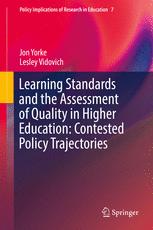

Most ebook files are in PDF format, so you can easily read them using various software such as Foxit Reader or directly on the Google Chrome browser.
Some ebook files are released by publishers in other formats such as .awz, .mobi, .epub, .fb2, etc. You may need to install specific software to read these formats on mobile/PC, such as Calibre.
Please read the tutorial at this link: https://ebookbell.com/faq
We offer FREE conversion to the popular formats you request; however, this may take some time. Therefore, right after payment, please email us, and we will try to provide the service as quickly as possible.
For some exceptional file formats or broken links (if any), please refrain from opening any disputes. Instead, email us first, and we will try to assist within a maximum of 6 hours.
EbookBell Team

4.0
36 reviewsThis book analyses accountability and quality policies relating to learning standards and examines their implications for assessment in higher education. Whilst primarily focusing on the Australian setting, this analysis is located within a broader frame of reference that includes the United Kingdom (UK), the United States of America (US), and the Organisation for Economic Cooperation and Development (OECD). Across these settings, comparative measures of learning have been seen as a policy ‘solution’ to the problem of ‘proving quality’ in a globalised and increasingly competitive higher education market. Comparative measures of learning depend on the specification of learning standards. Learning standards attempt to articulate the capabilities expected of graduates, and students’ achievement of these is determined through the practices of assessment carried out within institutions. Quality policy, learning standards and assessment practices all intersect within the broader umbrella of accountability, with relevance to governments, higher education providers, employers, parents, and students. The findings reported in this book highlight a number of policy influences, including the rising demands for national and international comparative data on learning standards to compare quality and inform student choice in a globally competitive market.